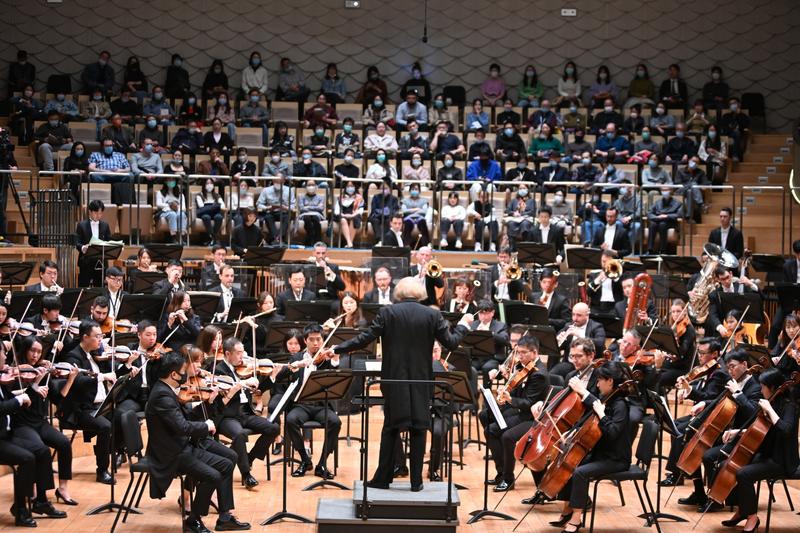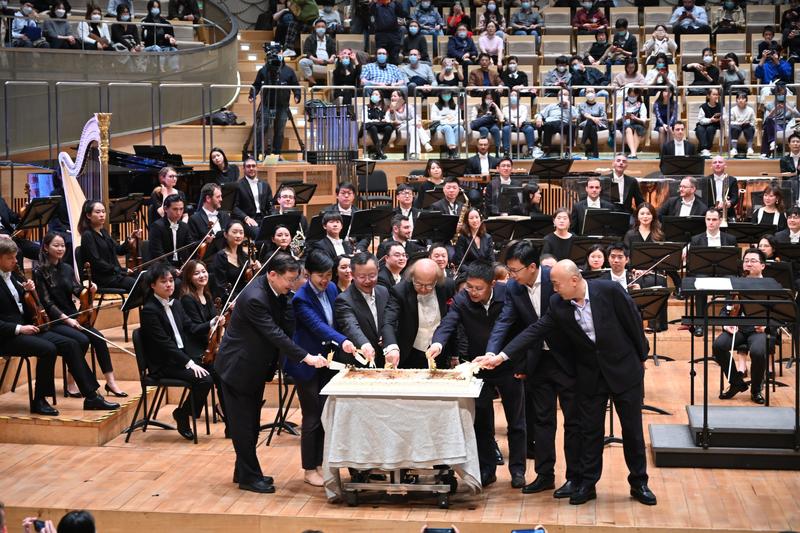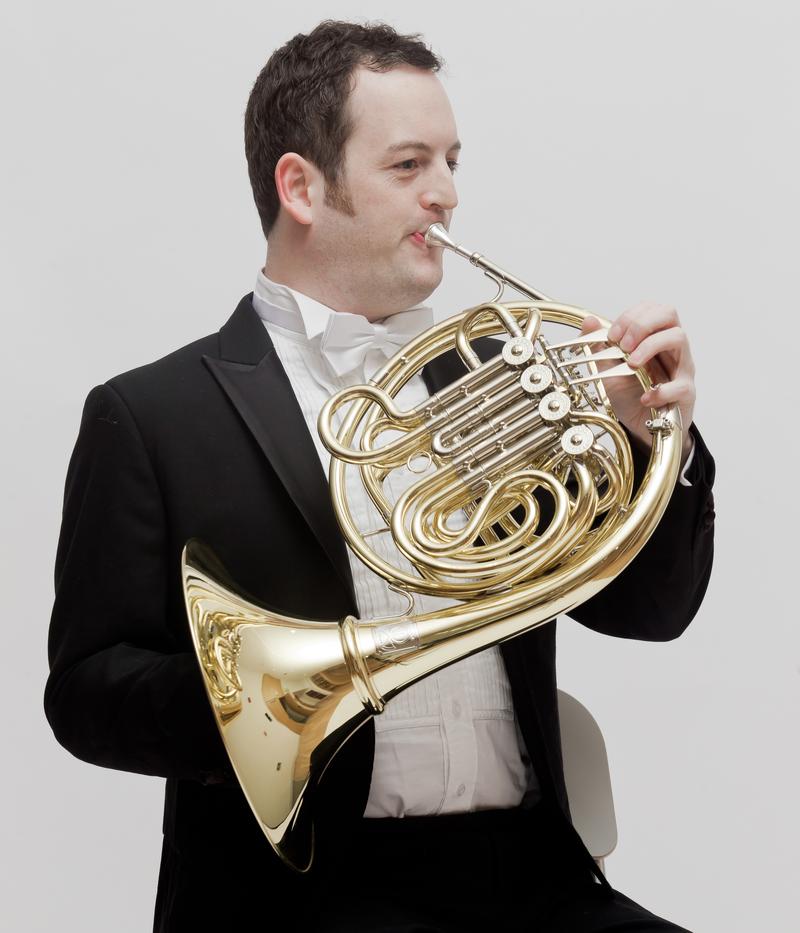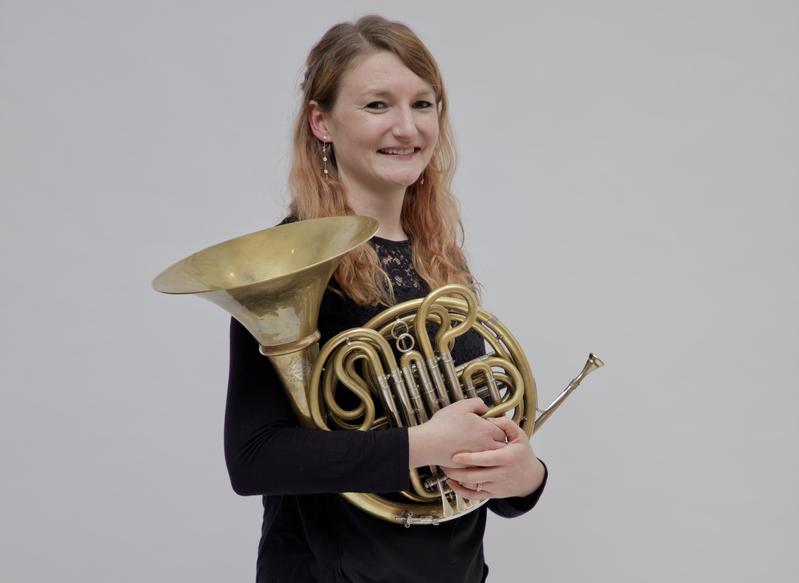Created from scratch in 2016, the city's symphony orchestra has gone from strength to strength, Chen Nan reports.
 The Suzhou Symphony Orchestra celebrates its fifth anniversary with a concert under the baton of conductor Chen Xieyang held at the Jinji Lake Concert Hall on Nov 18. (PHOTO PROVIDED TO CHINA DAILY)
The Suzhou Symphony Orchestra celebrates its fifth anniversary with a concert under the baton of conductor Chen Xieyang held at the Jinji Lake Concert Hall on Nov 18. (PHOTO PROVIDED TO CHINA DAILY)
Back in 2016, Chen Guangxian retired from the post of general manager at the Shanghai Symphony Orchestra, a position he had held since 1997. It wasn't long afterward that he was contacted by the local government of Suzhou and was invited to co-found a symphony orchestra for the city.
It was a long-held ambition for Suzhou, a city in East China's Jiangsu province, which has a rich history of old art forms, such as pingtan, an ancient form of singing and storytelling that dates back 400 years, and Kunqu Opera, one of the oldest Chinese art forms that dates back more than 600 years.
Since they come from different countries and have different musical backgrounds, these musicians have different playing styles. Though it’s a very young symphony orchestra, we’ve found our voice and taken it to a global audience
Chen Guangxian, general manager of the Suzhou Symphony Orchestra
Within eight months, Chen, with a decadeslong career in classical music, messaged many of his contacts in a bid to recruit musicians from around the world.
On Nov 18, 2016, the Suzhou Symphony Orchestra was founded. On the same date this year, the orchestra celebrated its fifth anniversary with a concert under the baton of conductor Chen Xieyang held at the Jinji Lake Concert Hall, home of the orchestra, performing music pieces by Russian composer Dmitry Dmitriyevich Shostakovich.
"Looking back, it was a very tough job to launch a professional symphony orchestra from nothing. We are proud that we have achieved our goal," says Chen Guangxian, now general manager of the Suzhou Symphony Orchestra.
He can still recall the orchestra's inaugural concert on Dec 31, 2016, which was also conducted by Chen Xieyang, the orchestra's musical director. World-renowned violinist Anne-Sophie Mutter and the Chinese pipa player Zhao Cong played, following which, more musicians joined the orchestra.
Now, with over 70 musicians from over 20 countries-more than 60 percent of whom are from outside China-the Suzhou Symphony Orchestra performs not only domestically, but also abroad. In its second year, the Suzhou Symphony Orchestra toured Germany and France. It has also visited Singapore, Japan and the United States over the past five years.
The orchestra also announced its 2021-2022 season, which brings over 50 concerts with music from the likes of Gustav Mahler, Rachmaninoff and Johannes Brahms. The ongoing season also features celebrated musicians, including composer Tan Dun, violinist Ning Feng, pianist Zhang Haochen and tenor Shen Yang. Chinese conductor Bian Zushan, 85, will celebrate his 60-year career by collaborating with the orchestra.
 A birthday cake is cut at the concert on Nov 18 to mark the orchestra's fifth anniversary. (PHOTO PROVIDED TO CHINA DAILY)
A birthday cake is cut at the concert on Nov 18 to mark the orchestra's fifth anniversary. (PHOTO PROVIDED TO CHINA DAILY)
According to Chen Guangxian, the five rounds of auditions in 2016 attracted nearly 500 musicians and were held in Europe, the US, Beijing and Shanghai.
French horn player Daniel James Coghill was among the first group of musicians who joined the Suzhou Symphony Orchestra in 2016 and his wife, Emma Whitney, also a French horn player, became a member of the orchestra a few weeks after Coghill was recruited. Both of them are British nationals.
"My teacher in London had heard about the auditions and recommended it to me. It sounded like a very unusual opportunity, so we decided to give it a try," recalls Coghill, 40, who started to learn to play French horn at the age of 10 after hearing Australian French horn player Barry Tuckwell perform a concerto with the Halle Orchestra in Manchester.
The couple worked with conductor Xu Zhong while Xu was in London. Xu offered them both positions at the Suzhou Symphony Orchestra.
"We were so surprised and excited to be able to work together in the same orchestra. It didn't take us long to accept," Coghill says.
 French horn player Daniel James Coghill. (PHOTO PROVIDED TO CHINA DAILY)
French horn player Daniel James Coghill. (PHOTO PROVIDED TO CHINA DAILY)
When they moved to China, both of them knew nothing about Chinese orchestras except that "there are many famous Chinese string and piano players".
"We had no idea what to expect. We just came here to discover something new," Whitney says. "We thought there would be a big culture shock moving to China, but we discovered that Suzhou is a very comfortable and welcoming city. So apart from some language barrier problems, we adapted very quickly. Even after five years, we still enjoy exploring the city in our free time. There are so many old streets, new developments, famous classical gardens and parks. There is always something interesting to see."
Whitney, 34, started to learn the French horn at the age of 8 after being inspired by her mother playing euphonium in a local brass band. She took lessons at school and enjoyed playing in youth bands until she was 18 years old, when she went to study orchestral performance at the Royal Northern College of Music.
Both agree that the most fascinating aspect of working in China is the integration of different cultures in one orchestra. They say playing Western classical music, as well as contemporary and traditional Chinese music, with musicians from all over the world that have different styles of playing, makes for a very rich artistic experience.
 French horn player Emma Whitney. (PHOTO PROVIDED TO CHINA DAILY)
French horn player Emma Whitney. (PHOTO PROVIDED TO CHINA DAILY)
"In Europe, classical music is a very old tradition and that is reflected in the audience, which tends to be mostly the older generation. The scene in Asia is more recently developed and the audience is much more diverse, including a lot of parents bringing their children to learn about music. It can be very difficult to keep classical music new and interesting to inspire new generations of musicians and we think China is doing a great job," Coghill says.
"Since they come from different countries and have different musical backgrounds, these musicians have different playing styles. Though it's a very young symphony orchestra, we've found our voice and taken it to a global audience," says Chen Guangxian.
Since 2018, the Suzhou Symphony Orchestra has launched Jinji Lake International Composition Competition, inviting composers from around the world to write music inspired by the city of Suzhou. Composers have borrowed from old Suzhou art forms, such as pingtan and Kunqu, for their own compositions, which, as Chen Guangxian says, is a great way to introduce Chinese culture to worldwide audiences through music. Due to the COVID-19 pandemic, international composers couldn't travel to Suzhou. As such, this year's competition highlighted 14 Chinese composers, who were commissioned to compose new pieces to celebrate the 100th anniversary of the Communist Party of China.
Contact the writer at chennan@chinadaily.com.cn


